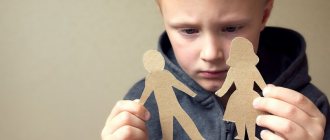Stages of personality formation in preschool age
The formation of personality implies the development of cognitive processes and moral qualities, the formation of a worldview and self-awareness, the development of independence in activity and social activity. This is not a complete list of those features that characterize a person’s personality, but they are the main driving forces in the formation of a child’s personality.
The listed components are laid in preschool age. The active start can be considered 3 years of age, when the child’s self awakens. By the beginning of schooling, personality formation goes through two important stages that contribute to the development of basic age-related characteristics:
- Stage of becoming independent
- Stage of formation of personal initiative.
The first stage of a preschooler’s personal development is aimed at gradually reducing physical dependence on an adult and acquiring independence. The baby repeatedly announces to his parents and grandmothers his need to act on his own. “I myself” sounds in those activities that are interesting to the baby.
The child tries his best. Such an understandable action as folding toys does not interest the baby at all, since it is understandable and feasible. But pouring soup into a plate using a ladle or pinning a pin on a blouse is incredibly exciting!
The second stage involves a transition from the choice that an adult offers the child to the manifestation of one’s own initiative. This is a significant expansion of the boundaries of development. “I want to put together this construction set model,” “I will also water the flowers,” “You know what game I came up with...” - the initiative of older preschoolers extends to all types of activities.
At these stages of a preschooler’s personal development, numerous changes occur. Moral judgments and criteria are developed: what is possible, what is not, what is good and what is bad. Emotional and volitional qualities develop. But in the sphere of personality development, the main achievement of preschool age is independence and initiative.
Personal developments of preschool age
Let us consider in more detail what new formations are formed in the personal development of younger preschoolers, and then in older preschool age.
Changes are especially noticeable during critical age periods. There are two of them in preschool childhood: the 3-year-old crisis, which replaces early childhood with preschool, and the 7-year-old crisis, which precedes the school period.
While the preschooler asserts his own independence, another important new formation is formed in his personal field - will.
The child is persistent in order to be allowed to do a certain action on his own. Having received the consent of the elders, the child most often faces a new obstacle - the matter cannot be argued! The button doesn’t fit into the buttonhole, the bag doesn’t rise, the tower of cubes falls apart...
The difficult task ahead is not to give up, but to try again and again until it succeeds. Therefore, such new formations as independence and will appear at the same stage of personal development.
The emergence of personal initiative awakens the formation of such accompanying new formations as determination and purposefulness.
For many children, it is easier to show initiative than determination. This quality is cultivated if adults encourage the cognitive activity of a preschooler. The child became interested in how a sprout emerges from a seed and took the initiative to plant it next to a houseplant. But then you need to water regularly and wait patiently for the sprout to hatch.
In such situations, the preschooler more often needs support in order to keep the goal in the field of his attention and interest. The child needs the same support if actions are unsuccessful. Along with initiative, to support the child’s desire for goals , since this is a valuable personal quality.
Development of personal characteristics in communication
Communication with adults and peers creates favorable conditions for the development of the personality of preschool children.
Most of all, children are busy with role-playing games, which involve following the rules prescribed by the plot. Before starting the game, preschoolers assign roles and agree on what rules they will follow.
This teaches diplomacy in communication, develops initiative, but at the same time the ability to coordinate one’s opinion with the opinion of others. The preschooler gets used to taking into account the interests of his peer, and in general perceiving him as a person, and not a mechanical partner in play activities.
In addition to business, moral qualities are laid in communication with peers. The preschooler shows sympathy if another is in pain and seeks to justify a friend if he is threatened with punishment.
The adults with whom the preschooler interacts show him an example of evaluating everything that happens around him. They approve, condemn, simply express their attitude. A child, like a sponge, absorbs such statements and forms his own value guidelines. For example, the only child in the family, who has all the toys at his disposal, will ask permission from a peer to take his car or doll only if adults explain to him.
It is impossible to foresee all situations that are important to teach a child. Therefore, the more a child is included in communication, the more fully his experience and system of moral guidelines will accumulate.
The development of a preschooler’s personality in social terms occurs due to the formation of a system of value orientations and norms of behavior. Internal positions and attitudes are formed. An older preschooler is already guessing how other people will treat him if he does this or that, acts this way or that way.
The Negative Impact of Negative Evaluation
Communication is unthinkable without evaluation. And the statements of adults also help the child form ideas about his capabilities. “You can’t jump off this ladder yet, I’ll help you,” “You can’t take a car from a boy. You will offend him,” “You can’t say that, it’s a bad word.” Such statements include prohibitions and denials, but they indicate important limitations to the preschooler.
Unfortunately, adults use many other types of negative assessments that emphasize the child’s inability and shortcomings. They can be divided into two types:
- Negative assessment of what was done (badly folded the toys, drew them unsightly, spilled the soup again).
- A predictive statement of a negative nature (don’t take it, otherwise you’ll break it; you won’t be able to; you’ll fall again).
Negative assessments of any kind inhibit the activity of a preschooler, distort the child’s opinion about his capabilities, harm the formation of self-esteem and limit personal development.
Text of the book “Development of a child’s personality from birth to one year”
Team of authors Development of a child’s personality from birth to one year Second edition
© Rama Publishing LLC, 2010
* * *
Authors' team
AVERIN Vyacheslav Afanasyevich (St. Petersburg), Doctor of Psychology, Professor, Dean of the Faculty of Clinical Psychology, Head of the Department of General and Clinical Psychology of the St. Petersburg State Pediatric Academy.
DOBRYAKOV Igor Valerievich (St. Petersburg), candidate of medical sciences, associate professor of the department of psychotherapy with a course of child and adolescent therapy at the St. Petersburg Academy of Postgraduate Education, chairman of the section of prenatal psychology, psychopathology and psychotherapy of the St. Petersburg Society of Psychologists, psychiatrist of the highest category.
OSORINA Maria Vladimirovna (St. Petersburg), Candidate of Psychological Sciences, Associate Professor of the Faculty of Psychology of St. Petersburg State University, Vice-President of the St. Petersburg Psychological Society.
SLOBODCHIKOV Ilya Mikhailovich (Moscow), Doctor of Psychology, Professor of the Moscow City Psychological and Pedagogical Institute, psychologist of the highest category.
PATRAKOV Eduard Viktorovich (Ekaterinburg), candidate of pedagogical sciences, deputy director for innovative development of the Sverdlovsk Regional Basic Medical College.
Irina Borisovna LEBEDEVA (Ekaterinburg), candidate of medical sciences, head of the department of advanced education of the Sverdlovsk Regional Basic Medical College.
MELAMED Gennady Moiseevich (Izmail), pediatrician of the highest category, family doctor.
NIFONTOV Sergey Anatolyevich (Ekaterinburg), senior lecturer at the Department of Organization of Work with Youth of the Ural State Technical University - UPI, Deputy Director for Scientific and Methodological Work of the State Budgetary Institution of the Sverdlovsk Region “Youth House”.
YAKOVLEVA Yulia Anatolyevna (Ekaterinburg), medical psychologist, lawyer.
KOCHEVA Elena Vladimirovna (Ekaterinburg), psychologist.
ILINA Valentina Nikolaevna (Ekaterinburg), practical psychologist.
Thanks to the readers
OVER SEVERAL YEARS of life, the series “Development of a Child’s Personality” has gained admirers in the form of tens of thousands of adults – parents, grandparents, specialists from different cities of Russia and from abroad, including Germany, Israel, Great Britain, and the USA.
Letters in which readers shared their impressions of the contents of the books convinced the creative team of the following:
The whole family reads the books “Development of the Child’s Personality”
– Most of the response letters came from married couples. It is especially pleasant that the publications enjoy authority and popularity among dads - they highly appreciated the thoroughness and encyclopedic nature of the publications, and their serious scientific foundation.
2. In letters to publishers and in statements on the forum, readers emphasized that the books “Development of a Child’s Personality” can be trusted
, because they were created by authoritative specialists - psychologists, teachers, pediatricians.
3. Books in the series are recommended to friends and relatives
– to everyone who has a person growing up in their family.
4. Books stay in the family
, because with such a reliable source of information, it’s not scary to go through the path of young parents again. And then, when the children grow up, give them books.
5. Books increase the psychological literacy of parents,
answering many questions related to the development of the child and relationships with him.
Thank you, our dear readers, for assuring us of the necessity and importance of publishing books in the “Development of a Child’s Personality” series, and we wish you further success in raising a growing person!
Editor's Preface
DEAR READERS! If you picked up this book, it means that for some reason you are close to the topic related to the development of the youngest children - from birth to one year. Perhaps you are parents, or maybe grandparents, close relatives or friends of a young family. The main thing is that you are very interested in whether everything is okay with the baby, whether he is growing and developing correctly. After all, you are not at all indifferent to what he will become in a year, two, three...
Our book will help solve many issues related to the upbringing and development of children in the first and most crucial year of life, when the child’s potential is laid – personal, intellectual, creative and physical. And the health and ultimately the happiness of the baby depends on how correctly adults assess the significance of this period.
Of course, such an important topic can only be entrusted to professionals. Therefore, pediatricians, psychologists, teachers, and other specialists worked for you. The goal of each of them was to help parents answer questions that arise while expecting a baby and in the first year of his life: to provide information about mental and physical development, about routine, feeding and nutrition, about how to care for a child, how to determine whether a child is healthy or not. whether he is, how to play with him, communicate, how to learn to understand this small, but already completely unique person, how to rejoice with him and explore the world together.
The book has five parts. The first is dedicated to the relationship between two loving people, to what extent he and she are ready to become parents, and understand all the responsibility with which they must prepare to meet the baby. The second part talks about a difficult and interesting period when a third person appears in the lives of two people, with his own temperament and mood, capable of feeling attitude towards himself and “telling” about it. A very small, but most important period of newbornhood - from the moment when the baby announces his arrival into the world with a loud cry, until one and a half months - is described in the third part. Here you will learn about the mental development of a child from one and a half months to a year. Parents of those children who experience health problems will find it useful to read part four. The book ends with the fifth part, which talks about how important the atmosphere of his home is for an inquisitive child, from which he begins to understand the world and feel his importance in it.
Many parents are interested in the question: how to create such an atmosphere in the family so that the baby feels comfortable and confident? The advice in the section “At an appointment with a psychologist” will help you answer it, which also explains why adults need to learn to respect and understand each other, and not be afraid to openly share their fears and doubts. Other sections: “ABC for Moms and Dads”, “Secrets of Psychology”, “Useful Tips”, “Play with Your Baby” - are intended so that adults can better understand the child’s world and the processes that he experiences in his development.
“Development of a child’s personality from birth to one year” is the first
in this series. In subsequent books we will talk about how all the vital systems of a child develop in the periods from one to three, from three to five years, from five to seven, from seven to eleven and from eleven to sixteen. What is the reason for this division by age?
periods of crisis during his life.
, preceding the onset of new stages in its development (physical, emotional, etc.).
Such crises, separating one stage from another, begin in childhood, and each of them is associated with the child’s preparation for certain types of activities, which in psychology are called leading.
Thus, the leading activity of the first year of life is direct emotional communication.
.
, object-manipulative activities
come to the fore .
role-playing games
become relevant , which gradually gives way to
educational activities
.
Educational activity, in turn, is replaced by intimate and personal communication
. And then comes the period of maturity.
Each book reflects the essence of the age period considered in it, the main mental developments and problems of this age, including medical and pedagogical aspects. Moreover, they are all interconnected, the line of one theme finds a logical continuation in the next volume, and vice versa, older age requires turning to an earlier period.
Direct emotional communication, characteristic of the age discussed in this book, is characterized by a special, never again repeated atmosphere of emotional contact between the mother, as well as other close adults and the child. From what
Whether this communication will occur will largely determine the further development of the baby and his formation as a person. Therefore, the entire volume is built on the principles of the “child-family” relationship.
For parents, the publication is a kind of guide to the mysterious and interesting world of childhood.
And now about those who wrote this book for you.
Part I. A FAMILY WHERE THERE ARE TWO – YOU AND ME
DOBRYAKOV Igor Valerievich: “The birth of a child and the age of the family.”
SLOBODCHIKOV Ilya Mikhailovich: introduction, “ He
plus
it
: mutual attraction.”
Part II. LIFE BEFORE BIRTH
DOBRYAKOV Igor Valerievich: “Why is it so important to plan a pregnancy”, “Working a miracle: how life begins”, “The baby feels everything. And mom?”, “The beginning of mental life”, “Contact? There is contact!
SLOBODCHIKOV Ilya Mikhailovich: “School of Love”, “Pregnancy: happiness or test?”.
Part III. THE MOST IMPORTANT IS THE FIRST YEAR
AVERIN Vyacheslav Afanasyevich: introduction, “The first year - and the whole subsequent life”, “Innate abilities of a newborn”, “Mental life of a newborn”, “Mental development of a baby”, “Psychology of the relationship between mother and child”, appendix.
SLOBODCHIKOV Ilya Mikhailovich: “What a baby can do,” “Formation of trust between parents and child.”
Part IV. HEALTH BEFORE BIRTH AND IN THE FIRST YEAR OF LIFE
MELAMED Gennady Moiseevich: “Health of the expectant mother”, “Health of the newborn”, “Health of the baby in the first year of life”.
LEBEDEVA Irina Borisovna: “Organizing a safe space for a child.”
NIFONTOV Sergey Anatolyevich, YAKOVLEVA Yulia Anatolyevna: “Attention: a special baby!”
Part V. THE KID AND CIVILIZATION
OSORINA Maria Vladimirovna: “The significance of a lullaby in the formation of a model of the world in a small child”, “Development of home space: materialization of the Self.”
The following also took part in the publication:
PATRAKOV Eduard Viktorovich: introduction, conclusion, section “At an appointment with a psychologist.”
KOCHEVA Elena Vladimirovna: section “Play with the baby.”
ILINA Valentina Nikolaevna: section “ABC for dads and moms.”
Introduction
Childhood that has slipped into oblivion leaves us with memories and sensations, the echoes of which flow into our lives, sometimes determining its rhythm for a long time. A child's soul is an instrument obedient to tuning and at the same time a tuning fork against which one can compare the sound of adult life.
Children's feelings of happiness and carefree come to us as hope for the best in times of difficulties and failures. Children's dreams are in many ways landmarks and beacons for us. Surveys of people who consider themselves happy show that most of them have made their childhood dreams come true. Moreover, happy husbands see and feel women’s love as a continuation of mother’s love and consonance with it.
Parental love is natural for adults who have given birth to a new life, and it is necessary for it. This is an immutable truth, and it is unlikely that anyone will dispute it. But everyone puts their own meaning into the concept of love. Some see it as forgiveness, others as concern for well-being, and still others accept the baby as he is.
The way we treat a child determines the style of his upbringing. A baby needs interaction and communication with adults, like food, like care, like mother’s milk. But almost every parent faces questions, the answers to which are devoted to many works of teachers and psychologists. Perhaps one of the most important questions is how exactly
communicate and educate? After all, the world of a baby is completely different from our world as adults. A small child thinks differently (yes, he actually thinks), his experiences are a reflection of parental emotions, his happiness lies in a sense of security, and his perception of the world is so subtle and direct that the child sometimes does not separate himself from the whole world at all. Therefore, communication with a baby is an entire art, the shadows and reflections of which fall on the rest of your life.
Today in psychology, early childhood is receiving increasing attention. The reason for this is the discovery of new possibilities in babies. For example, some European scientists argue that the baby is characterized by the same biological mechanisms as higher vertebrates. One of them is the mechanism of imprinting, when the child is unconsciously able to copy (or strive to copy) the movements and speech of the mother. This issue is still being discussed among scientists, but you can conduct a small experiment yourself: smile at the baby or make some kind of grimace. The baby's face will immediately change. What is this: an answer to you or just a copy reaction? But one way or another, this mechanism is applicable in the practice of family education. Smile at a crying baby. Perhaps this will be enough to calm him down!
From the first days, the child’s self-image and emotional sensation are formed. Self-esteem and self-respect subsequently grow from this feeling. And the formation of self-image is influenced not only by the feelings of the parents, but also by well-built relationships with the child. Therefore, parents should also have certain knowledge about the age-related characteristics of the child’s development.
Do you know what a child wants when he cries or when he reaches out to you, what toys and at what age does a child need, when does he have his first words? Very few parents can accurately answer these and many other questions related to child development.
The book, originally conceived as a leisurely conversation between psychologists, has grown into a single medical, psychological, pedagogical and family consultation. Infancy is unthinkable without parenthood, and above all without motherhood. And parenting is family. Therefore, we could not help but devote a separate chapter to the family and its crises.
Infancy is also inseparable from the period of birth. Moreover, psychological preparation for pregnancy is very important, as is preparation for conception!
If a child is sick, starts to be capricious and you don’t know how to calm him down, if you want to know how to be able to “read” his mood by crying or the movements of his arms and legs... Everything is written here.
The authors of this book - psychologists, teachers, doctors - thoroughly and clearly strive to tell attentive parents how the normal development of a child should proceed, how to determine immediately after birth whether he has delays, and if so, how to catch up. Moving away from instructions and moralizing, specialists consider specific examples from the practice of family counseling, introduce the successes and experiences of those who may live in your neighborhood and are raising their child.
This work accumulates the latest achievements of the system of sciences about infancy. It will be useful not only for those who already have children, but also for those starting a family and professionals.
Part I Family, where there are two - you and me
Introduction
SO MANY PEOPLE, as we know, so many opinions. If you ask a hundred parents: why do you actually need a child? – we will hear a hundred different answers. One of the first reactions of many will be bewilderment. The strange ones, they say, have found something to ask about. However, when they begin to answer, they begin to think at the very first phrases (words, thoughts). But really, why?
The relationship between parents and children can be debated almost endlessly. And not just argue, just talk. And very, very much will be said: the fact that children are the meaning of life (the meaning of existence), we live for the sake of children; and what it’s like to be left alone in old age, to know that there is no one in the whole world and there is no one to call or write a letter to, and that children are our pride, and our joy, and happiness, and pain, without which there is also nowhere. And they would remember that children are an opportunity not to repeat our mistakes and to do a better job than we did, and to live a better and happier life.
And it will also be said that our children are the future, the one we will not see, and the continuation of the family, and the bearers of culture, ideas, thoughts, knowledge. Everything will be said correctly, everything will be to the point, but one question will remain, an incomprehensible question, an absurd one: why? Why, so that they are better than us. Why, in order to necessarily continue something and somewhere, why, in order to make sense... The question sounds strange, not only incorrect, but even somehow blasphemous. But there is no blasphemy here and not even much strangeness.
A huge variety of answers to “why” can be divided into two layers. What happens is this: in one case the child will not be there for anything.
and not
for some reason
, but by itself. Like self-worth. Like an equal. How significant. How free. Initially. What are you doing, how can you do it yourself? And the parents have nothing to do with it? What does it have to do with it. But more on that later.
In another case (and in all others), the child is a condenser (collector) of our aspirations and hopes, and expectations, and desires. What is incomprehensible, wrong and abnormal here, you ask. Everything is clear and everything is correct if... If we are expecting a child who is kind, smart, warm-hearted, gentle, proud, independent, strong, self-sufficient.
If a child for us is an opportunity to love what we don’t love, an assistant in business and a continuer of traditions (an heir, so to speak), if he is an opportunity to escape somewhere from boredom, despair, loneliness, an opportunity (the only one!) not to be left alone in old age, and thus more than to prove that I am no worse than everyone else, or even out of resentment, out of a sense of contradiction, out of spite, in spite of, etc. - this is where it is, the second option.
In the first case there is us
, parents (mom plus dad), and
he
, the child. Not worse, not better, not as a replacement or substitute. He himself (but with us or... we with him?) grows, laughs and cries, makes mistakes and achieves success, reasons, thinks, learns to think, gets upset, hates, loves... He loves, loves the whole world, loves himself and us. He loves us not just because we are his parents, but also because we exist. We are. And he is. We are equal. We are one. We are happy.
In the second case there is also us
, parents (mom, dad plus...), and there is a duty, necessity, compulsion.
And also - a feeling of guilt, helplessness, inevitability... And there he
- a child, together with us, and sometimes instead of us, bearing this load, hump, heaviness...
But what about love, where is it not? She is. There is, but... this is no longer quite love and not only love, and sometimes not love at all... These are fulfilled and unfulfilled hopes, justified and unjustified expectations, happiness from the fact that everything turned out as planned, and bitterness and resentment from ingratitude , unappreciated, useless...
The reader - mom or dad, future, present, after reading these lines, will say: okay, good, convinced. Let's say everything is as you say. But what then can be done to ensure that the child is born equal? So that we love him not for some reason or for some reason, but simply because he exists - how can we do this? Raise him, perhaps, in a special way? Where to begin?
Our smart, competent, wonderful reader who wants to know will be right. And who, tell me, doesn’t want our children to grow up happy and live long and again... happily. Where to begin? Start over.
He plus she: mutual attraction
The first step to starting a family
This is not the first time the question has been asked, nor the second, nor the third. What is family? Here I was, alone, then she
, there are two of us.
We
have become . We live under the same roof, we run the same household, we share our joys and sorrows. Is this already a family or not?
Perhaps the most important thing in starting a conversation is defining the goal. Why, why do people come together, form a couple, a family. If, without further ado, we take the simplest case: mom, dad plus a child, since without children this is probably not really a family, rather just a couple, the relationships in it (in the family) will be determined by the answer to this very question - why? ?..
Let's try to answer.
From the point of view of sociologists, a family is “... a small group based on marriage and consanguinity, the members of which are connected by a common life, mutual assistance, and moral responsibility...”.
In the world of wise thoughts
Only in marriage, perceived as a natural continuation of a long journey towards self-discovery, does it make sense to have children. Then children automatically become a true complement to the path of mental, spiritual growth, which will never end, because such is the essence of man on this earth. In this way, children also become part of the ongoing struggle to get ever closer to harmony, to mental and spiritual self-knowledge. Valerio Albisetti
So, a family is needed in order to run a household, so that there is someone to help if something happens, and also to continue the family line. Everything seems to be extremely simple and clear; It’s not clear why the problems that arise in the family (and not only in this, the initial, maternal, and then in the children’s families) are much more serious and deeper than household, economic, or related to the unwillingness to help each other. Although there is also a grain of truth in this last nuance. Strangers always want to help in everything for no reason
appears infrequently. After all, there are enough problems of our own. Traditionally, there are several stages in the development of a family and a number of family functions (which, it is important to note, can be clearly divided into “parental” and “children”).
Without reproducing cumbersome and boring schemes, we will try to highlight the most important thing: at the first stage - it can conditionally be called pre-family
– relationships are built between people who, in essence, do not yet know whether they will be spouses or not. What happens is that interest arises between two people, on the basis of which sympathy develops. Interest, by the way, can arise completely by accident, spontaneously: an ordinary acquaintance in a company, meeting eyes in transport. Interest in a person is always based on a certain element of the unconscious. It is very difficult, almost impossible to say what exactly interested you: maybe thoughtfulness, or the similarity to someone you know (friends, relatives), or appearance, or a casual glance... Sympathy is a purely emotional state, not subject to reasonable logic. I like it - that’s all, but I don’t know why. By the way, the same can be said about antipathy. Hardly any of us, adult fathers and mothers, will pay attention to the fact that our children often like or dislike the same images and types as we do.
Based on interest and sympathy, communication begins, essentially a conversation - getting to know each other. Some take hours, some take months, some take years, you can’t predict in advance. It is important that during the time of “recognition” one person becomes accustomed to another, and then attachment arises.
Perhaps some of the more inquisitive readers have asked whether it happens that the relationship between two people does not go beyond addiction, and whether it is possible to create a family on this basis. It also happens. However, if one person is nothing more than a habit for another, then the family will be with the mindset of “habitually being nearby”, nearby not because you want to, but because you don’t want to... change, change, search, spend... (In A. Marinina in one of the detective novels there is such a character - a man who married solely because this woman annoyed him less than the others.)
Based on affection, emotional involvement in relationships (that is, when it no longer matters who is nearby, but you want him
or
she
) a friendship is formed. This concept already presupposes the desire to reckon with each other, and the undoubted importance of the other person, and therefore, respect for him. The desire to communicate, to be close for as long as possible, colored by sexual desire, we call falling in love. This is the dawn of family life. However, there is still more than one step from falling in love to love. It is far from news that real, real love also carries with it a certain calculation. We begin to look fundamentally differently at the situation of possible personal and shared existence (co-existence is where the family, in fact, originates). If a person is dear, and important, and needed, it is very logical to think about where and how to live, how comfortable life will be and how much this necessary comfort will cost. The most important thing is that in a situation of love, a person necessarily thinks about himself - and do not consider this a manifestation of egocentrism - he thinks about how the other person will be next to him, how he himself will be next to the other person.
Perhaps the most controversial, although certainly sublime, definition of love is expressed by the phrase “Paradise with the darling in the hut.” On the one hand, sacrifice, the desire to endure, to create everything “from scratch”, if, of course, together, together; on the other hand, how long will one live in a hut given the “unwarm” current times?
The second stage is family
, but still without a child, suggesting the opportunity to “live for yourself.” And at the same time, without thoughts about the future child (children), he is unlikely to be prosperous.
At this stage, speaking in strictly scientific language, the correlation of the ideal idea of a family with reality begins.
A small scientific digression is necessary here: let’s give the concept of “family” from the point of view of psychologists.
Any person, no matter how rational and down-to-earth he may be, necessarily has what is called an “ideal idea,” an “ideal image.” The concept of “ideal representation” means what is desired, taking into account all requests “to the maximum.” In reality, of course, this does not happen. However, I want to. In fact, this “want” is the meaning: an ideal family is the model of family, the option that you want to see.
So, firstly, the more “real” a person’s position is, the better he imagines possible reality, the fewer problems there will be. You should not, of course, think that you need to start with a critical, serious assessment of everything that is happening.
When he
and
she
begins to lead her own life, separate from all others, a huge mass of little things appears (and not only), to which attention was not paid before or was paid only in passing. As you know, little things have a nasty tendency to accumulate, and when there are too many of them, the initial mild irritation develops into real resentment.
Secondly, family is always unfreedom. It is more responsibilities than rights, it is more giving than receiving, it is equal parts victories and defeats, it is always change - constant, continuous.
“...The likelihood of a harmonious union between a man and a woman is directly determined by the similarity of the family models from which they came…” (S.V. Druzhinin). So, it turns out, by choosing a life partner, building a relationship with him (her), we thereby lay the “foundation” of the family of our children. The child learns his future marital role by mentally identifying himself with a parent of the same sex. One can say more: any of our actions, actions, especially patterns of behavior are directly related to our own family, the one from which we came. There are always two poles here: either “analogy”, repetition (not necessarily, of course, exactly), or “protest” (the opposite of what is seen and remembered). Of course, both are extremes. The only possible middle ground is to combine both approaches together, carefully analyzing your own actions and actions. “So, it won’t take long for you to go crazy, and in general, if you constantly control yourself, then when will you live?..” A natural remark. However, a family is, first of all, self-restraint in order to find the opportunity to move freely together.
In the world of wise thoughts
Falling in love is essentially consonant with the psychology of a child who, in his childhood desire for “omnipotence,” wants to get everything at once; love is the lot of mature people who are not afraid of time, but on the contrary, take it into account. Valerio Albisetti
Thirdly, every family has its own more or less difficult periods, crises, problems - this is inevitable and a given. This is fine. The well-being of the lives of two and the behavior of the third (child) will be determined by the ability to overcome crises and resolve conflicts. Somewhere to hold back, somewhere to give in, somewhere to take responsibility for solving the problem.
Fourthly, if you go back a little, look at the actual situation of development, growing up of the future mother or future father, you can identify a very significant link that “directly” prepares the answer to the question: why
families are formed, and at the same time
how
.
According to psychologists, we choose a partner with whom it is easier for us to reproduce a situation that was not resolved in childhood... And this is quite logical and natural. In childhood, a lot was needed: you had to be and feel loved, needed, desired, successful. It was necessary to be understood and approved by those people whom we respected and appreciated. Not everyone was lucky: the right people weren’t found, circumstances didn’t work out, parents were too busy, there were no sisters and brothers, or, on the contrary, there were some, but everyone was younger, which means the responsibility rests with you, the eldest - in general, a lot of things. And so we begin to look for a person who will “give us” what we didn’t receive in childhood. We find and... often lose. The other one has something of his own, and he is waiting for help and support from us. In general, again a vicious circle. There is apparently only one way to break out of it: to realize oneself as a free person and treat others in the same way. Easier said than done, of course. It’s easier to say - harder to do, but nevertheless it is necessary. The stakes are very high – not only your own happiness, but also your children’s.








